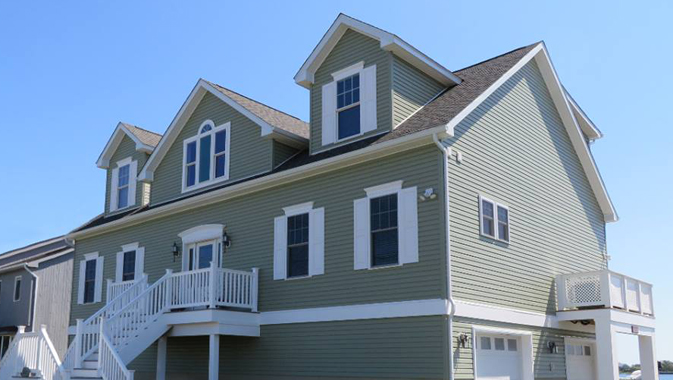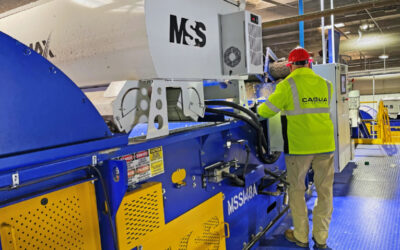Signature Building Systems is a leading manufacturer of custom designed, pre-site built homes. The Pennsylvania based business has completed over 4,500 projects throughout the eastern seaboard – everything from ranches and capes to two-story homes and special, custom designed floor plans, as well as estate homes, multi-family residences, hotels, and even entire apartment complexes.
~
Whatever the project, Signature can work with the customer’s builder to get it done.
The manufacturing process takes place at a state-of-the-art plant “built with the sole intention of being a custom modular home manufacturing facility,” says Justin DePhillips, Signature’s Director of Sales & Marketing. “Most of our competition’s facilities are converted from the old mobile home industry or rail car industry, or something similar to that. We were able to design our building with the sole intention of being a custom home manufacturer; as a result, we’re able to do some things differently.”
The entire structure was laid out with efficiency in mind, with each workstation carefully positioned to increase productivity. “Our jigs, our mezzanines, our bridge cranes are positioned in such a way that they serve a number of departments, so we are able to move our material more efficiently,” Justin explains.
The Moosic, Pennsylvania plant also features the modular industry’s latest, most advanced technology. Some of this special equipment allows Signature’s craftsmen to pre-fit sections, components, and even entire roofs before the structure is shipped to its destination. “We will pitch the roof in our plant to make sure it fits. We will put the gable end panels in to make sure they fit and then we will disassemble them.” This extra level of care ensures that the home will reassemble perfectly once it reaches the site. It also sets Signature apart from its competitors. “We are the only ones that I know of in our marketplace that actually proof the roofs,” Justin reports.
Every step of the manufacturing process takes place inside the plant’s controlled environment. “The product is built in our facility from start to finish.” This means that all materials, from lumber and sheet rock to insulation and shingles, are protected from the weather – and, the staff can work every single day in comfortable conditions, regardless of whether it is raining, snowing, freezing cold, or sweltering hot outside. Removing weather delays from the equation helps the team maintain a predictable, and relatively rapid, timeline. Typically, it only takes about eight days to build one module and the entire process – from hammering the first nail to turning over the keys – usually takes around 100 days.
Building within a factory environment creates an assembly line-like situation in which the same people do the same job every day, ensuring they have the experience to carry out the task. “The person who is framing walls today is going to be framing walls tomorrow,” Justin explains. “We are not bouncing labor around. Everyone is trained on a specific skill set.” Economies of scale allow for a larger workforce, creating yet another advantage. “We will have 85 people working on the house at any given time, as opposed to a conventional site-built house where you might have a total of forty or fifty people. The results are that you are getting twice the workforce for a lot less money.” Those economies of scale also extend to materials, and Signature has the purchasing power to snag the best deals and pass those savings on to consumers.
Another key advantage is that Signature’s modular construction process is environmentally friendly. For starters, building indoors gives craftspeople more control over waste. “If you are cutting lumber outside it is going to fall into a mud pit or a dust pile and it is going to get discarded or forgotten until the end of the process. Whereas with Signature, it is going to fall onto a concrete floor, so we are able to reuse a lot of the pieces of lumber for blocking, jack studs, and for a lot of different areas in the house that you wouldn’t normally think of. Again, because everything is indoors, we are able to bundle all of our old sheetrock, put it on a pallet, and send it back to the manufacturer to recycle. So we are really able to control our waste.”
Equally important, every Signature home meets basic Energy Star certification and is 15 percent more energy-efficient than a standard home, with the potential to be 20 to 30 percent more efficient. A number of elements come together to ensure high energy-efficiency, from careful sealing and closed-cell foam insulation to low-E windows. “There is no air getting in or out of your house,” Justin explains. “That is a great thing for your energy bills.”
Signature has a wide variety of projects under its belt, from single-family homes to hotels, motels, assisted living facilities, townhouses, and retirement communities. Whatever the project, the company is able to deliver a customized solution. Using computer aided design (CAD) technology, Signature’s draftsmen work closely with the customer’s builder to create a unique design. Or, customers can simply choose from a long list of standard plans.
Signature maintains a goal of building 60 to 70 modules a month, about 75 percent of which are used in single-family homes. On average, a two story single-family home requires three modules, while a ranch only needs two. The largest module that the company can build measures 15’x9’x66’, but these modules can be put together in virtually any configuration onsite, allowing the team to create extremely large residential structures in addition to single family homes.
For example, Signature built an entire dorm in Syracuse, New York for State University of New York’s Environmental Sciences and Forestry School (SUNY-ESF). The team used a whopping 184 modules to build the Centennial Hall dormitory in 2010, then created an addition using 70 modules last year. The largest project that Signature has completed to date, the dorm has been well received on campus for its environmentally friendly construction.
In another large-scale project, the team built a La Quinta Inn & Suites in Hershey, Pennsylvania. The three story, 81 room hotel has an indoor swimming pool, fitness center, dining area, meeting facilities, and sleek, modern interiors. Signature partnered with a modular developer specializing in hotels to deliver the 48-module project. “We had built two other hotel franchises for that same developer, so when we were approached to do [the La Quinta Inn & Suites] it was a no-brainer because we have a great relationship with the developer.”
The company’s ability to carry out complex projects starts at the top. Industry veteran Victor DePhillips launched the family-run company in 1992 and his son, Justin, came on board as soon as he graduated from college in 2007. “My father has been in this industry for 42 years,” says Justin. “He started in a factory. He framed exterior walls and worked his way up the plant until he came into an ownership role. In 1992 he started this business and hasn’t looked back since.” Victor’s on-the-ground experience positively impacts the entire operation and ensures that managerial decisions reflect best industry practices.
The father and son team make it a point to maintain a close-knit company culture. “It is a family atmosphere,” Justin says. “I grew up knowing a lot of the guys here, so I have a lot of ‘uncles’ around here. We thrive on the family atmosphere. That is just how we are.” Maintaining strong relationships with builders and developers is also emphasized.
After 23 years in business, the team remains excited about the future. “I think there are plenty of opportunities,” shares Justin. For the next five years, the goal is to become a totally debt-free business. After that, the company will likely focus on growth. “Being that I am only 30, my personal goal is to expand again,” he says. With experts at the helm and a roster of high profile projects on the company résumé, successful expansion certainly seems a likely bet.













